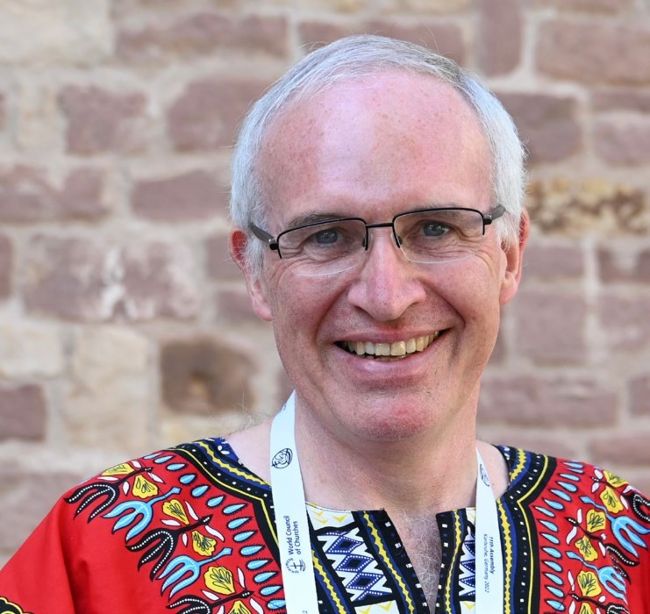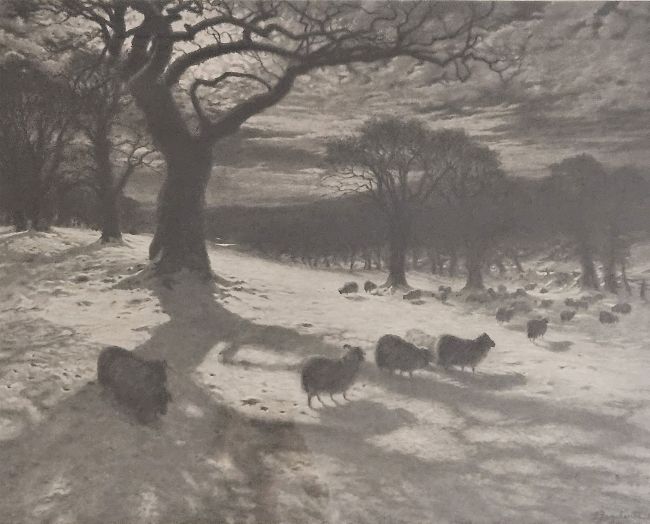COVER
A ‘multifaceted and profound’ relationship
Marking Black History Month, Jackie Macadam examines the links between Africa and the Church of Scotland – and how African ministers are changing the church today.
IN a meeting room at the Church of Scotland offices in Edinburgh hangs an impressive etching by WB Hole, RSA, of a Joseph Farquharson painting.
It is a winter scene, with sheep grazing in a darkening evening light. It was given as a gift from the Asian delegates to the Church’s St Colm’s College after the 1910 Edinburgh Mission conference. There were only a handful of non-white people there. The message below the engraving is “Other sheep I have” ( John 10.16), a reminder to the people then, and us all now, that God is a God of all people everywhere.
In Britain, Black History Month is celebrated in October, and the achievements and contributions to society of Black people are given the recognition that is often missing from our traditional history, both narrative and written.
The Church of Scotland has a particular and long-standing relationship with Africa, spanning generations of missionaries from David Livingstone and Mary Slessor to those whose constant faith and hard work never made headlines back home. Mission partners work with communities in Africa today, continuing that relationship.
Ken Ross is Professor of Theology and Dean of Postgraduate Studies at Zomba Theological University in Malawi.
“
The gamechanger was David Livingstone and his now-legendary travels in Africa in the mid-nineteenth century.
He said the history of the Church of Scotland connections with Africa really came to the fore with David Livingstone.
“For most of the Church of Scotland’s history its members had little awareness of Africa. The gamechanger was David Livingstone and his now-legendary travels in Africa in the mid-nineteenth century.
“His death in 1873 sparked a national determination to build on the connection between Scotland and Africa that he had begun. In part, his vision involved drawing on the resources of his native land – faith, education and industry – to help meet challenges that Africa was facing. After all, the eradication of the slave trade had become the great cause of his life. Yet for Livingstone, it was never a one-way relationship. He knew how much he himself had been inspired by the people, culture and environment of Africa. This deep experience was one he hoped could be shared by many of his fellow Scots.
“His hopes have not been disappointed. Many Scots have spent significant parts of their lives in Africa. Invariably, they have concluded that anything they were able to contribute was small in comparison with all the ways in which their life was enriched by their African experience. At the heart of this has been the Church of Scotland and its missionary work in different parts of the African continent. Innumerable families and communities came to have an African connection. Again, it has had a two-way character. The work of the missionaries proved to be transformative in a variety of African contexts. At the same time, there was a transformative effect in Scotland itself as involvement in Africa’s struggles and triumphs broadened and deepened the faith and commitment of many church members. To many of them, the African dimension brought a broader idea of the nature of the church. They discovered that, as well as being a local worshipping community, it is a fellowship that spans the earth and transcends racial, cultural and geographical boundaries.

Gary Brough

Kenneth Ross.
Credit: CorinnaWaltz EMW
“The extent to which the Church of Scotland took Africa to heart was demonstrated in the early 1950s when, against the wishes of the African population, the British Government took the decision to establish the Federation of Rhodesia and Nyasaland. There were some strong economic arguments for forming such a political unit, but it was predicated on the domination of a white settler minority in southern Rhodesia. In a colonial age this racist arrangement seemed quite normal to many people, but it was not acceptable to the people of Nyasaland (later Malawi). In those days it was not easy for them to make their voices heard in the corridors of power. What they could do was to share their concerns with their Scottish friends.
“Hence it was in Scotland that the proposed Federation met with determined resistance. A mass meeting on the ‘Crisis in Central Africa’ was held in Edinburgh in January 1953, chaired by Very Rev Prof John Baillie and featuring a speech by Nkhosi ya Makhosi M’mbelwa, the Ngoni paramount chief from northern Malawi. A ‘Petition from the People of Scotland’ was signed by 27,000 people, often a minister or elder signing on behalf of a whole congregation, to be presented to the Queen.
“At this stage Scottish opposition was to no avail. When the General Assembly met in 1959, however, there was a State of Emergency in Nyasaland and history hung in the balance. Four British Cabinet ministers sat in the gallery as the Assembly approved a motion that ‘The time has come for a daring and creative transfer of power to the African people’.
“British Government policy soon changed, and events moved swiftly as Malawi attained self-government in 1962 and full independence in 1964. The historian John McCracken expressed surprise that the socially conservative Church of Scotland of that time could challenge the Government in such a radical way. It was the deep connection that had been forged with the black African community in Malawi that inspired the political action.”
The Rev Elijah Obinna hails from Nigeria but works as a parish minister in Carluke.
He’s confident that the impact of African Christians on the Church of Scotland is significant and ongoing.
“The Church of Scotland has historically been involved in missionary work across the globe, with Africa being a significant focus,” he said. “Traditionally, discussions about the Church of Scotland’s relationship with Africa have emphasised the contributions of Scottish missionaries to the continent. However, a less explored but equally important narrative is Africa and Africans’ contributions to the Church of Scotland. These contributions touch on areas including theology, church growth, cultural enrichment, and social justice. The crosscultural exchanges between Africa and Scotland are a refreshing transformation that reshapes the church’s mission, cultural landscape, and community engagement within Scotland and beyond.
“The traditional African worship styles, rich with energetic singing, dancing, rhythmic drumming, and dynamic preaching, increasingly bring vitality to worship in some Church of Scotland congregations. Moreover, African members have introduced alternative cultural celebrations and festivals to their congregations, including child naming ceremonies. These events have fostered greater intercultural understanding and appreciation among congregants.
“This joyous blend of traditions diversifies the worship experience, making the church a melting pot of cultural expression and shared faith. Scottish congregants are encouraged to learn about and appreciate African cultures, deepening their understanding of global Christianity and fostering a spirit of unity and solidarity that transcends cultural and geographical boundaries.”
Elijah is particularly interested in how the growing numbers of African ministers are being innovative in Scottish congregations.
“Despite their significant contributions, African ministers and members often face challenges within the Church of Scotland, including racial prejudice and cultural misunderstandings,” he warns.
“These challenges test the church’s commitment to diversity as it works to create an inclusive environment. Furthermore, the rise of African ministers to leadership positions within the Church of Scotland will signal a pivotal shift towards inclusivity and diversity. Their presence will challenge historical norms and inspire other minority groups, fostering a governance structure that reflects Christ’s diverse body and demonstrates the Church of Scotland’s commitment to inclusivity.
“African Christians bring a wealth of theological insights influenced by their cultural and historical contexts. These perspectives often emphasise communalism, resilience, and a profound connection with the spiritual and natural world, challenging the traditional Western theological frameworks of the Church of Scotland. Themes of liberation, justice, and the experiences of the marginalised come to the forefront, prompting the church to re-evaluate its stances and adopt a more holistic approach to faith. Drawing from their deep-rooted traditions of community support, Africans in the church spearhead initiatives aimed at social justice, poverty alleviation, and community development. Their grassroots mobilisation and hands-on approach contrast with more institutionalised models, emphasising practical action and deep community engagement. This invigorated mission strategy extends the church’s reach and relevance, inspiring congregants to be more proactive in their faith.
“
These contributions challenge the traditional narrative that often views the relationship between the Church of Scotland and Africa as a one-sided missionary endeavour.
“The contributions of Africa and Africans to the Church of Scotland are multifaceted and profound. From theological enrichment and church growth to cultural diversity and social justice, Africans continue to shape the church’s identity and mission in the modern world. These contributions challenge the traditional narrative that often views the relationship between the Church of Scotland and Africa as a one-sided missionary endeavour. Instead, they highlight a dynamic and reciprocal relationship where both parties have much to offer each other. Recognising and celebrating these contributions not only honours the African members of the Church of Scotland but also strengthens the church’s commitment to being a truly global and inclusive body of Christ.”
Gary Brough is Capacity Development Facilitator, CCAP Synod of Livingstonia, Malawi. He feels that the contribution from Africa to the Church in Scotland is becoming greater than ever before.
“With present trends, the face of the global church is changing. The Archbishop of Canterbury, Justin Welby, put it bluntly: ‘The average Anglican is an African woman in her 30s living in sub-Saharan Africa on less than $4 a day’. This shift must be reflected in our international relationships,” he says.
“The church faces some of the same challenges in Scotland and Malawi but for different reasons. A shortage of church ministers and limited resources for running the church are common struggles. The church in Malawi, however, has been working through these challenges for much longer and has lessons to share. For example, lay training and ministry are vital to the church’s functioning in Malawi.

The Rev Elijah Obinna
“Despite Christians being a significant majority in Malawi, evangelism remains at the heart of the church. Guilds, youth groups, and Sunday Schools are all responsible for outreach and not simply catering to those already within the church. Congregations establish and nurture prayer houses in nearby communities, many of which become congregations. There is no doubt that Scotland is a different context, but these focused, local expressions of outreach are worthy of reflection.
“In Scotland, we have learned hard lessons as patterns of church-going have changed. We can’t – and shouldn’t – assume that the patterns of Scotland will be replicated in Malawi or elsewhere. But we can have the humility to share from our struggles and not just our strengths. These could prove to be important lessons for the church in Africa, which faces a growing youth population – the median age in Malawi is 17.8 years, for example.
“Global mission and international church partnerships have never been an exclusively one-way street. But perhaps now, when sending seems so difficult, we can change our posture to be better at receiving.
“There are already pastors from various African nations ministering within the Church of Scotland, and with Scotland’s own changing communities, we should keep that door open. As resources seem more limited, hopefully, future partnerships will be less about the flow of people and funding and more about mutual exchange to meet shared challenges and opportunities within the body of Christ.

Etching by WB Hole
“As the Rev Baxton Maulidi, Deputy General Secretary of Blantyre Synod, said recently in a conversation with the Moderator of the General Assembly of the Church of Scotland, the Rt Rev Dr Shaw Paterson: ‘It’s not about the resources, it’s about the bonds that unite us’.”
“We would do well to hear more such wisdom from the church in Africa.”
“Africa and the Caribbean are not uniform, yet there are parallels,” says the Rev Dr Ian Alexander, International Partnerships Manager with the Church of Scotland’s Faith Action team. “Both are rich, diverse, multi-layered and multi-cultured, with places of incredible beauty; both have dynamic Christian communities; both are suffering the effects of climate change and conflict; both have been colonised, and are being exploited commercially; both are rich in natural and human resources.
“Martin Luther King Jr said, ‘peace is not merely the absence of tension, it is the presence of justice.’ The need for justice is an overarching necessity to allow for human flourishing and the possibility of life in fullness. Church of Scotland partners in Africa and the Caribbean are embedded in their countries and communities. All the churches in partnership with the Church of Scotland pursue life in fullness for their members and wider societies,” he says.
“Dr Afe Adogame, a Nigerian Christian, emphasises the centrality of “ubuntu”the inherent human-ness and humaneness of every person in relationship to each other and to God. Peace and ubuntu are essential to grasping an understanding of an African worldview and achieving life in fullness for all. Many of the churches in Africa and the Caribbean are at the heart of attempts to address local conflicts and promote peace and justice to their communities experiencing conflict, change, and a loss of identity in a turbulent world.
“Relationships with the churches today are vibrant and dynamic,” he concludes. “The Churches welcome Scots visiting – see how the Moderator was welcomed to Kenya and Malawi in August – but want a modern relationship built on attentive listening and real engagement.
“Mutual respect is at the heart of a modern relationship between the Church in Scotland and the Churches in other parts of the world.” ¤